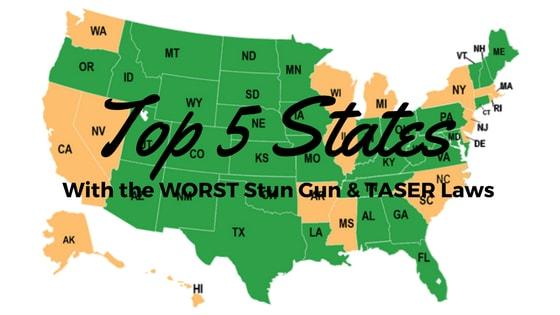Table of Contents
- Understanding State Variations in Stun Gun Legislation
- Key Restrictions and Legal Requirements to Know Before You Buy
- Navigating Permits and Carrying Rules Across Different States
- Expert Tips for Safe and Compliant Stun Gun Ownership
- The Way Forward
Understanding State Variations in Stun Gun Legislation
Across the United States, stun gun laws exhibit significant diversity, reflecting regional perspectives on personal safety and law enforcement concerns. Some states permit the unrestricted purchase and carry of stun guns for self-defense, while others impose stringent regulations or outright bans. For example, states like Texas and Arizona generally allow open and concealed carry without requiring a permit, whereas states such as Massachusetts and New York maintain rigorous restrictions, often necessitating licenses or disallowing possession entirely. This patchwork of regulations underscores the importance of understanding local statutes before purchasing or carrying a stun gun.
Key areas of variation include:
- Permitting Requirements: Some states demand background checks and permits, while others have no such prerequisites.
- Age Restrictions: The minimum age to legally carry a stun gun varies, typically ranging from 18 to 21 years old.
- Carry Type: Whether stun guns can be carried openly, concealed, or both depends heavily on state legislation.
- Prohibited Areas: Certain locations like schools, government buildings, and airports often have explicit bans regardless of state permissions.
Key Restrictions and Legal Requirements to Know Before You Buy
Before purchasing a stun gun, it’s crucial to familiarize yourself with specific legalities that vary widely from state to state. Some states have outright bans on stun guns, while others allow possession but impose strict regulations such as mandatory permits or age restrictions. Additionally, certain locations-like schools, government buildings, and private properties-may prohibit the carrying or use of these devices regardless of state laws. Understanding these nuances helps avoid costly fines or legal trouble and ensures responsible ownership.
Key considerations to verify before buying include:
- Permit requirements: States like New York and Illinois often require a license or permit to carry and use stun guns legally.
- Age restrictions: Many states limit stun gun possession to adults, typically those 18 and older.
- Restricted locations: Even in states where stun guns are legal, their use might be prohibited in schools, airports, parks, or other sensitive areas.
- Self-defense limitations: Some states regulate how and when stun guns can be employed, limiting their use solely for self-defense purposes.
Navigating Permits and Carrying Rules Across Different States
Understanding the legal landscape surrounding stun guns requires careful attention to each state’s unique framework. Some states operate on a permit-based system, demanding residents to obtain licenses before carrying or purchasing these self-defense tools. Others may allow possession but strictly regulate where they can be carried – such as prohibiting stun guns in schools, government buildings, or private establishments. In states like Texas and Florida, for instance, the emphasis is on open carry versus concealed carry distinctions, which can drastically change the legal implications for users. Always verify whether local municipalities have ordinances that impose additional restrictions beyond state law to remain fully compliant.
When navigating the permit process, many states require applicants to undergo background checks and sometimes additional training or certification. States like California and New York are known for their rigorous permit requirements, which can include detailed paperwork and longer waiting periods. Conversely, in states such as Arizona or Utah, stun guns might be classified similarly to other less-regulated self-defense devices, simplifying legal access. Regardless of where you live, maintain a thorough awareness of the following:
- Specific permit and carry categories applicable in your state
- Age restrictions and eligibility criteria
- Limitations on where stun guns can be carried, including any “sensitive location” bans
- Renewal processes and potential fees associated with carry permits
Expert Tips for Safe and Compliant Stun Gun Ownership
Owning a stun gun responsibly goes beyond merely knowing the laws-it demands a commitment to safety and ethical use. First, always store your device securely in a locked container or safe to prevent unauthorized access, especially in homes with children or curious visitors. Treat your stun gun like any other self-defense tool: regularly inspect its functionality to ensure it activates properly, and never carry it in a manner that risks accidental discharge. Additionally, familiarize yourself thoroughly with your state’s legal nuances regarding possession and use, as some areas require permits or impose restrictions on carrying stun guns in public places.
Practice makes perfect, but when it comes to stun guns, practice means responsible preparation rather than frequent use. Consider enrolling in a self-defense class that includes stun gun training to learn safe handling techniques and build confidence in using your device if the need arises. Maintain awareness of your surroundings and remember that stun guns should only be deployed in genuine situations of threat or danger. Here are some key practices to keep in mind:
- Keep the stun gun fully charged to ensure maximum effectiveness.
- Never brandish or threaten with the device to avoid legal trouble.
- Inform close family or roommates about its presence to avoid accidental misunderstandings.
- Regularly review updated state laws to stay compliant as regulations evolve.
The Way Forward
Navigating the complex landscape of stun gun laws across the United States can be challenging, but staying informed is essential for responsible ownership and use. Whether you’re considering acquiring a stun gun for personal protection or simply want to understand your rights, this state-by-state guide aims to clarify the varying regulations that govern these devices. Remember, laws can change, so always double-check current local statutes before purchasing or carrying a stun gun. Staying educated not only helps you stay compliant but also ensures your safety and that of those around you. Stay informed, stay safe!Check Our Other Blogs
- StunGun – Your Trusted Source for Stun Guns, Laws, and Self-Defense Tips
- PepperSprayLaws – Your Trusted Resource for Pepper Spray Information
- StunGunLaws – Your Trusted Guide to Stun Gun Legality and Safety



